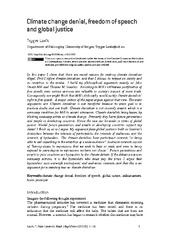Climate change denial, freedom of speech and global justice
Peer reviewed, Journal article
Published version

Åpne
Permanent lenke
https://hdl.handle.net/1956/12244Utgivelsesdato
2015Metadata
Vis full innførselSamlinger
- Department of Philosophy [240]
Originalversjon
https://doi.org/10.5324/eip.v10i2.1923Sammendrag
In this paper I claim that there are moral reasons for making climate denialism illegal . First I define climate denialism, and then I discuss its impact on society and its reception in the media. I build my philosophical arguments mainly on John Stuart Mill and Thomas M. Scanlon. According to Mill’s utilitarian justification of free speech, even untrue opinions are valuable in society’s pursuit of more truth. Consequently one might think that Mill’s philosophy would justify climate denialists’ right to free speech. A major section of the paper argues against that view. The main arguments are: Climate denialism is not beneficial because its main goal is to produce doubt, and not truth. Climate denialism is not sincerely meant, which is a necessary condition for Mill to accept utterances. Climate denialists bring harm, by blocking necessary action on climate change. Primarily they harm future generations and people in developing countries. Hence the case can be made in terms of global justice: Would future generations and people in developing countries support my claim? I think so, or so I argue. My argument from global justice is built on Scanlon’s distinction between the interests of participants, the interests of audiences, and the interests of bystanders. The climate denialists have participant interests ‘in being able to call something to the attention of a wide audience’. Audience interests consist in ‘having access to expressions that we wish to hear or read, and even in being exposed to some degree to expressions we have not chosen’. Future generations and people in poor countries are bystanders to the climate debate. If the debate postpones necessary actions, it is the bystanders who must pay the price. I argue that bystanders’ costs outweigh participants’ and audiences’ interests, and that this is an argument for a statutory ban on climate denialism.
